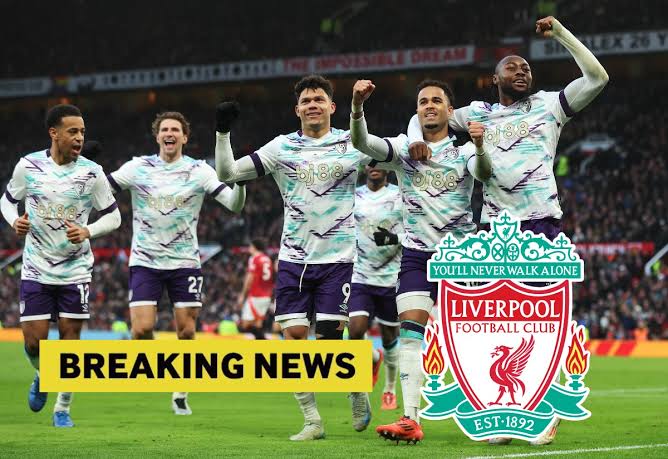When Football Stops: The Moment Antoine Semenyo Said “No More

In the 28th minute of what should have been a celebration of Premier League football’s return, the beautiful game came to a temporary halt. Not for injury, not for a VAR check, but for something far more serious – and far more shameful.
Picture this: 53,000 fans packed into one of football’s most iconic venues. The anticipation of a new season, the excitement of Liverpool versus Bournemouth under the Friday night lights. Then, suddenly, an eerie quiet descends over Anfield as referee Anthony Taylor walks purposefully toward Bournemouth’s Antoine Semenyo.
What followed was a two-minute pause that felt like an eternity – a moment where the sport we love was forced to confront one of its ugliest realities. Semenyo, a 25-year-old Ghana international whose only crime was being Black and talented, had been subjected to racial abuse from someone in the crowd.
The irony wasn’t lost on anyone present: here was a player who would go on to score both of Bournemouth’s goals in a thrilling 4-2 encounter, being targeted not for his football ability but for the color of his skin.
What makes Semenyo’s response so remarkable wasn’t just that he reported the abuse – it was what happened next. After the brief stoppage, after the conversations with referees and captains, after the weight of 53,000 pairs of eyes upon him, he didn’t retreat. He didn’t let the hatred win.
Instead, he channeled whatever pain, anger, or frustration he felt into his boots. He scored twice. He played the full 90 minutes. He turned what someone meant as an attack on his dignity into a masterclass in resilience.
As Bournemouth captain Adam Smith later reflected with genuine bewilderment: “I don’t know how Ant’s played on, to be honest, and come up with those goals.” It’s a question that speaks to the extraordinary mental strength required to perform at the highest level while carrying the weight of discrimination.
The protocol that unfolded – Taylor consulting with coaches Arne Slot and Andoni Iraola, speaking with both captains, ensuring the incident was properly documented – represents years of progress in how football handles discrimination. Gone are the days when such incidents might be ignored or brushed aside.
But perhaps more telling was the immediate human response. Bournemouth teammates surrounding Semenyo with support. Liverpool players offering solidarity to an opponent. Smith demanding immediate action from the referee. These weren’t scripted responses from a diversity training manual – they were authentic reactions from footballers who understood that an attack on one of them was an attack on all of them. “The Liverpool players were supportive toward Antoine and the rest of the team,” Smith noted, highlighting how football’s tribal nature can be transcended when humanity is at stake.
Bournemouth manager Andoni Iraola captured the frustration perfectly: “It’s a shame because a really great game of football, the first game of the season with everyone watching, and we have to be talking about this thing still today.”
Here was a match that had everything – goals, drama, outstanding individual performances, the excitement of a new Premier League season. Yet instead of discussing Hugo Ekitike’s dream debut or analyzing tactical nuances, we’re forced to confront the reality that in 2025, racial abuse still mars our sport.
“We should be past this stage but there’s still people who don’t behave correctly,” Iraola continued, his words carrying the weight of collective disappointment. Every step forward the sport takes, every campaign against discrimination, every show of unity, can feel diminished by one person’s decision to spew hatred from the stands.
Credit where it’s due: the institutional response was swift and appropriate. An anti-discrimination message resonated around Anfield at halftime. The Premier League promised a full investigation and support for the player. The Football Association expressed concern and committed to working with all parties.
These aren’t empty gestures – they represent a football ecosystem that has learned, sometimes painfully, that silence enables hatred to flourish. The fact that the perpetrator was identified shows that technology and vigilance can work together to hold people accountable for their actions.
But beyond the official statements and investigations lies a more fundamental question: how do we create an environment where players like Semenyo never have to make the choice between reporting abuse and playing on in silence?
Smith’s reaction – admitting he was “in shock” and full of “admiration” for his teammate – reveals something crucial about how discrimination affects not just its targets but entire communities. The shock of witnessing such behavior, the admiration for someone’s courage in facing it, the collective responsibility felt by teammates and opponents alike.
When Smith asked Taylor to immediately remove the abuser from the stadium, only to be told about “process” and police involvement, it highlighted the tension between the desire for instant justice and the need for proper procedures. Sometimes doing things right takes longer than doing things quickly, but the end result – accountability and consequences – matters more.
The Premier League’s statement that “racism has no place in our game, or anywhere in society” isn’t just corporate speak – it’s a reflection of how far football has come in acknowledging its responsibility as a cultural force. The commitment to “ensure our stadiums are an inclusive and welcoming environment for all” represents an ongoing challenge that requires constant vigilance.
For Semenyo, this incident will likely be remembered alongside his two goals against Liverpool. The tragedy is that a player’s courage in facing discrimination might overshadow his athletic achievements. The hope is that his example – standing up, speaking out, and then performing brilliantly – inspires others to refuse to let hatred define their experience.
This wasn’t just about one person saying something deplorable to one player. It was about the reality that racism persists in spaces where it should have been eradicated long ago. It was about the courage required to speak up when speaking up might be easier than playing on. It was about institutional responses and human responses and the gap that sometimes exists between them.
Most importantly, it was about a 25-year-old footballer from Ghana who refused to let someone else’s hatred define his evening. Instead, he scored twice, played brilliantly, and reminded everyone watching that talent, dignity, and resilience will always triumph over ignorance and bigotry.
In the end, Antoine Semenyo didn’t just play football on Friday night. He stood up for every player who has faced similar abuse, every fan who has felt unwelcome in stadiums, and every person who believes that sport should unite rather than divide. The game resumed after two minutes. The fight against racism continues.















